- Home
- Michael Dobbs
Last Man to Die Page 4
Last Man to Die Read online
Page 4
Cazolet squeezed on to the narrow seat and tried to make himself comfortable, knowing he had little chance of success. When the House of Commons had been hit by a stray Luftwaffe bomb in 1941 the team of firefighters, already sadly depleted by the firestorms blazing around London, had faced the choice of saving either the Commons or the more ancient and gracious construction of neighbouring Westminster Hall. The comfort and convenience of politicians was balanced in the scales by the firemen against the preservation of an important part of the nation’s Tudor heritage; the Commons had been left to burn until gutted.
For a while this had caused considerable disruption until the members of the House of Lords came to the rescue and gave over to their common-born colleagues the facilities of the undamaged Upper Chamber, a still more impressive Gothic edifice than the one left smouldering in ruins. Yet their hospitality had not stretched to the civil servants who accompany ministers, and so Cazolet and his kind were condemned to squashing on to a row of hard wooden stools tucked away in one corner. Not even the glories of uninhibited Victorian craftsmanship could do much to distract from the numbness that crept over Cazolet’s body less than ten minutes after perching on one of those hideous stools. Still, today he had other distractions and for once had forgotten that he could feel little from his shirt tail down.
An air of expectation filled the Chamber. Members of Parliament, many of them in the uniforms of the armed forces in which they served, bustled to find themselves a position on the red leather benches while others loitered around the extravagantly carved oak canopy covering the sovereign’s throne. Something was up. The word had gone round – the Prime Minister was coming to the House to make an important statement – everyone wanted to be in on it. Cazolet sat with a conspiratorial smile; these were the times he found his job so rewarding, when the whole world seemed to wait upon a prime ministerial utterance, the words of which Cazolet himself had drafted. And this one was going to be a cracker.
The Prime Minister walked purposefully into the Chamber, conspicuous in full morning dress with flowing coat tails, a spotted and loosely secured bow tie at his throat and his father’s gold watch fob stretched across the front of his waistcoat. The outfit was not new, indeed it gave the solid impression of having been made for him at least twenty years earlier, since it bulged and stretched in too many places. It should have been replaced long ago, but he felt comfortable in it. Anyway, Clemmie was always nagging him to be less extravagant.
No sooner had he found his place on the front bench than he was given the floor. ‘Mr Speaker, I pray the House will forgive the exuberance of my attire,’ he began, a thumb stuck firmly in his waistcoat pocket. The Old Man was teasing them, keeping them waiting, building up the atmosphere. ‘I have not, as some Honourable Members might conclude, come straight from the racecourse’ – there was a ripple of polite laughter. It wasn’t a very good joke, but if he could begin with any form of joke the news must be exceptional – ‘but from an audience with His Majesty the King. Just an hour or so ago I received news which I thought it only right to share with him and with the House at the first possible opportunity.’
‘He’s called an election,’ someone shouted from the back benches. It was a Labour MP renowned for his ready heckle, and Churchill rose willingly to the bait as more laughter washed across the House.
‘No, sir! The Honourable Gentleman must contain his impatience. He reminds me of a Black Widow spider, anxious for his date with destiny but who will undoubtedly discover that his love affair with the electorate will end only in his being brutally devoured.’
The Old Man was in good form, and there was general waving of Order Papers around the Chamber. The antagonisms of partisan politics had been laid to one side during the lifetime of the coalition government which Churchill led, but they were never far below the surface and were getting less restrained as it became apparent that an election and a return to normal parliamentary hostilities must be only weeks away.
‘Mr Speaker, sir, the whole House will know that a few days ago the Allied armies reached the western bank of the Rhine, the historical border of Germany.’ A low chorus of approval rose from the MPs, but Churchill quickly raised his hand to silence them. His tone had grown suddenly more serious. ‘No one could have been in any doubt that the crossing of the Rhine would be a deeply hazardous enterprise, with all the bridges across that vast river destroyed and the Nazi armies fighting fanatically to protect the homeland with their own towns and villages at their backs.’ He paused while he took a large linen handkerchief from the pocket of his trousers to clear his nose, and the habitual crease that ran down the centre of his forehead deepened into a frown. The Chamber was completely silent. Was it bad news after all? He had them all in his grasp – all, that is, except Cazolet, who struggled to contain his smile as he watched his master trifling with their emotions.
‘The Rhine is the last great barrier standing between our armies and complete victory. I have to tell this House that late last night a junior officer, a lieutenant, of the United States First Army, succeeded in’ – he hesitated slightly, toying with the words – ‘walking across a bridge at a small town called Remagen. It appears that the Germans, in their anxiety, failed to blow the bridge properly. Mr Speaker, the Rhine has been crossed. We have a bridgehead on German soil!’
The announcement was greeted with an outpouring of relief and jubilation on all sides, many Members rising to their feet to applaud and others shaking the hands of opponents they would normally have difficulty addressing in a civil tone. Churchill stood, triumphant in their midst, yet wishing for all the world that he were young again and could exchange his role for that of the lowly American lieutenant.
Once he had resumed his seat, other MPs rose to offer their congratulations and thoughts, giving the Prime Minister fresh opportunity to bask in the sun of military success.
‘What did you advise the King?’ asked one.
The Prime Minister’s demeanour was full of mischief. ‘The House may not know that in the dark days of 1940 I gave His Majesty a carbine, for his own personal use in the event of invasion.’ His eyes twinkled. ‘I advised him that it was my firm opinion he would no longer need it.’
They loved it. Churchill’s sole regret was that he couldn’t hold the election instantly in the midst of such unqualified rejoicing. More questions, more praise. No one expected other than further fulsome accolades when Captain the Honourable Gerald Wickham-Browne, MC, DSM, caught the Speaker’s attention. The captain, junior scion of minor aristocracy, had lost an eye during the retreat from Dunkirk yet still managed to regard military combat with the sort of unrestrained enthusiasm normally found only amongst schoolchildren at a cup final. He was on his feet, standing in parade ground fashion, hands clasped behind his back and black eye-patch thrust proudly towards the distant ceiling. But he was not a happy man.
‘Is the Prime Minister aware, as delighted as I am to hear the news, that the honour of being the first to cross the Rhine was to have been left to British troops under General Montgomery? While of course we are delighted at the Americans’ good fortune in being able simply to walk across’ – Cazolet marvelled at how Wickham-Browne managed to make it sound as if a mongrel had run off with a string of prize sausages – ‘what is now to be the role of British troops, who have been preparing for months for the storming of the Rhine and who by sheer bad luck have been denied their share of this triumph? Are we to get anything by way of …’ He hesitated, unsure of the most appropriate word, before deciding it didn’t matter a damn anyway. ‘… compensation?’
Churchill rose to respond, his chin working up and down as he sought for the words of his reply, rubbing his thumbs in the palms of his hands in instinctive search for the cigar he wished he were smoking. ‘Let us not quibble over the fortunes of war. It is enough that the Rhine has been crossed. But let us not forget what this event has proved to us. First, that German resistance is crumbling. And second, that if we can pursue the battle with speed a
nd flexibility, and can grasp the opportunities which confusion and indiscipline amongst the enemy may present, then nothing can stop our march across Germany. I have no doubt that now is the moment of our greatest opportunity, and that British forces will be in the vanguard of the victory which is surely to come. I have already telegraphed my sincerest congratulations to General Eisenhower and told him that our troops stand ready for the next challenge. Onward Britannia! Nothing can stop us now!’
At times of great crisis, words can be more powerful than bullets. Churchill had proved that time and again during the days of the Blitz when he had precious few bullets and little else with which to resist the enemy and to maintain British morale. He was conscious of the effect his words could have, yet, as he resumed his seat to the congratulations of his parliamentary colleagues, he had not the slightest notion of the impact they were causing several hundred miles away, at the Supreme Headquarters of the Allied Expeditionary Forces, where his congratulatory telegram was bursting into fire like a grenade thrown through the window.
‘What in God’s name is this crap?’ The message trembled in Eisenhower’s hand.
British troops are ready … Now is the moment to swarm across the bridgehead at Remagen …
The flush of anger was spreading across his face as he read every new sentence. The adjutant who had delivered the telegram took another precautionary step backwards; the general was reputed to have an unreliable temper, and he didn’t care to be around to suffer the uncertain consequences.
German resistance and morale may collapse if you strike before the enemy has time to regroup …
Eisenhower continued to quote from Churchill’s missive. ‘Shit, doesn’t he realize we’ve got less than two hundred men perched on that bridgehead and they could get blown away any time? If we put so much as another pack of paperclips across that stinking bridge it’ll topple into the river. What’ll happen then? Our guys on the bridgehead become sandwich meat, that’s what!’
Suddenly he pounded his head as if to inflict punishment on himself. ‘What a fool I am … Losing my wits. Why didn’t I realize straight away what that scheming old bastard was up to?’ He read on.
The arguments for a direct drive on the German capital become irresistible. Let us drive down the autobahns which Hitler himself has built and not dare to stop until we have reached Berlin.
‘Berlin! So that’s still his game.’
He turned in his chair and screamed through the open door into the next office to his chief of staff. ‘Beetle! Get in here and bring a stenographer. I want to send a reply.’
Lieutenant General Walter Bedell Smith and the stenographer scuttled in without a word and perched in front of Eisenhower. There they sat, pencils poised, for several long moments while Eisenhower remained lost in thought. Ice seemed to have taken the place of the fires within him. Eventually Bedell Smith could stand the uncertainty no longer.
‘Changed your mind?’
Eisenhower raised his head from his thoughts and looked at him with piercing blue eyes.
‘Beetle, how do I say “Fuck You” in British?’
The commander tapped his stick against the chair to demand silence. In the darkness of the night the entire prisoner complement of Transit Camp 174B huddled together on the exercise square in search of companionship and warmth, forming a human amphitheatre around the flames of an open fire. Their faces stared gaunt and drained of colour in the flickering light like ghosts gathered around a grave. They expected no comfort from the commander’s words. An Ehrenrat had been called, a ‘Council of Elders’, and that only happened when there was a real mess.
The commander sat at their head, with his two senior officers on either side and several others standing behind. He was leaning on his stick even while seated, his face a lurid mask as some player in a tragedy.
‘My friends,’ the commander began. A few of them noticed that he had forsaken his customary formal greeting – ‘Men of the Wehrmacht!’; there was no suggestion of command in his voice. ‘My friends, I have gathered you all together to share with you the news I was given today. I can find no words to lessen the pain, and so I …’ He lowered his head, struggling for composure and fresh strength. He cleared his throat, as if the words were sticking in his gullet like phlegm.
‘The Russians are fighting on German soil. They are already well advanced into Pomerania, and have crossed the Oder. They are less than a hundred miles from the Hauptstadt, Berlin.’
The words carved like a razor through their midst as damp wood spat on the burning pyre, cremating their last hope of salvation. No one bothered to contest the news, to pretend it was enemy propaganda. Such bravado belonged to the days when they had bombers in the air and food in their bellies, and those days were long since gone. They all understood what the news meant. Many of them had fought on the Russian Front, had seen the bestiality with which the Russian peasant soldiers treated captured Wehrmacht and civilians alike. They had found the mass graves of butchered officers, shot in the back of the head, of the women raped and mutilated, of the children slaughtered for no reason other than they had got in the way. The Russians knew only one method of fighting war, to the bitter end, and that end was now in sight. Cossacks swarming through their homeland, penetrating their villages and their women, pillaging everything and everyone in their path. They, the soldiers of the Wehrmacht, had failed, leaving their loved ones to pay the price.
‘I’m so sorry,’ was all the commander could find to say. He fell into silence until it became oppressive and he had to find something else to break it. ‘My only satisfaction is that you have survived. You are brave men, I have fought and served with many of you. We have survived. That, at least, is something. Perhaps we may yet have the opportunity of rebuilding our country …’
He trailed off in a savage fit. of coughing. There was shrapnel in his lungs and in other vital parts of his body, and to a man they knew that whatever might lie in store for the rest of them, the commander would not be part of it. They had all seen the tell-tale translucence of the skin clinging to his skull, the glaze across his eyes and the bloodstains on his handkerchief; only his pride and sense of duty had kept him going this far. In sympathy and silent embarrassment they watched as the commander brought up a little more of his rapidly fading life.
They stood aimlessly, staring silently into the flames, dispirited and without hope, lost in contemplation of a homeland far away. Then something moved, a man, one of their own, who stepped forward into the circle surrounding the fire. He wore the tattered uniform of an Oberleutnant in some tank regiment – it was impossible to tell which; almost all the insignia were missing. Nevertheless he was a striking-looking figure, tall, lean to the point of gauntness, his cropped black hair parted near the middle so that it stood up in a defiant, almost disrespectful manner before flopping across the forehead of his long face. His features were finely carved as if sculpted from smooth clay, his cheekbones high – looks that suggested intelligence and sensitivity which seemed out of place in the middle of a band of warriors. Yet he had obviously seen combat, and sported a scar through the top of his lip which dragged one edge of his mouth downward, giving the impression of a perpetual sardonic smile. There was suffering in the face, and nowhere more clearly than in the eyes which were remarkably dark and deep-set as if trying to keep their distance from the world. They were careworn from more than just the numbing tiredness of past combat, yet as the commander gazed at him they became almost transparent. He felt he was peering right into the man’s inner soul, and inside he could see flames of torment. There was passion and anger in this man. The prisoner snapped to attention.
‘Permission to speak, sir?’
‘You are …?’
‘My name is Hencke, sir.’
The commander nodded for him to continue.
‘I have family in the east, in the Sudetenland. For all I know, the Russians are there already.’ There were sympathetic nods from amongst the men. ‘Your pardon, Commander, b
ut I’m not content to sit idly back on my ass comforting myself in the thought that I am a survivor while those I love face the Russians. Sir!’
The reprimand implicit in his words and the rough language used to his commanding officer caused a stir of anger, but the commander waved it away. He was too tired to fight, particularly with one of his own men.
‘I intended no sense of satisfaction in what I said, Hencke, but survival is all we have to look forward to. I fear there is little other choice.’
‘I believe we always have a choice …’ The sting of accusation in his voice had guaranteed him a hearing, but now he had their attention and his voice softened. ‘Sir, it is the duty of German officers to resist. It is an oath of duty which we have all taken and which still, to us all, should be sacred.’
‘An oath to generals and politicians who got us into this mess?’ a voice interrupted from the darkness at the edge of the fire.
Hencke turned in the direction of the questioner. He had begun addressing the whole group, not just reporting to his senior officer, holding centre stage in the midst of an audience he could scarcely see in the night gloom. His gaze travelled around the group slowly, deliberately, piercing through the darkness at the shadowy masks which confronted him, probing like a scalpel into their inner thoughts. ‘I agree. What have our beloved generals and politicians done for me? I haven’t even got buttons to do up my flies anymore, and my proudest possession is the piece of string I use for a belt. It’s difficult marching unquestioningly behind your leaders with your trousers round your ankles – present commanders excepted, sir.’
A stirring of appreciation rustled through the prisoners.
‘Whether our leaders have let us down or not, my oath of duty wasn’t taken for their personal benefit but for my country and for those I left behind. It’s them I’m interested in. They are the ones who deserve our help. And we’re doing nothing to help them sitting round here scratching ourselves and gossiping about three “Fs”.’

 Last Man to Die
Last Man to Die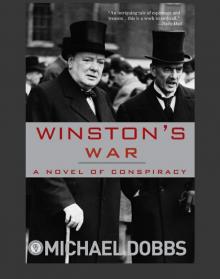 Winston's War
Winston's War The House of Cards Complete Trilogy
The House of Cards Complete Trilogy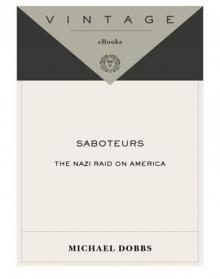 Saboteurs
Saboteurs The Touch of Innocents
The Touch of Innocents WC02 - Never Surrender
WC02 - Never Surrender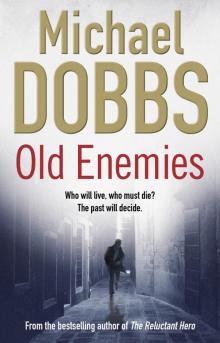 Old Enemies
Old Enemies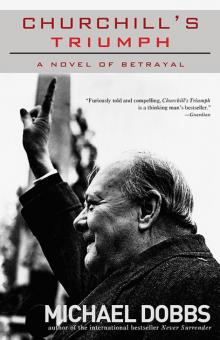 Churchill's Triumph
Churchill's Triumph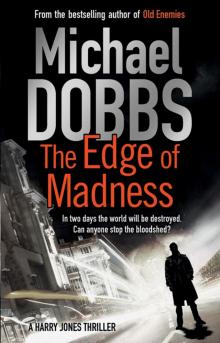 The Edge of Madness
The Edge of Madness Goodfellowe MP
Goodfellowe MP The Final Cut
The Final Cut Whispers of Betrayal
Whispers of Betrayal Churchill's Hour
Churchill's Hour The Buddha of Brewer Street
The Buddha of Brewer Street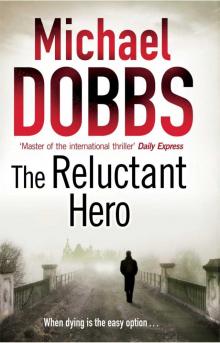 The Reluctant Hero
The Reluctant Hero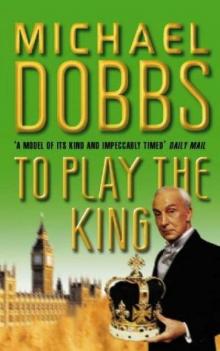 To Play the King
To Play the King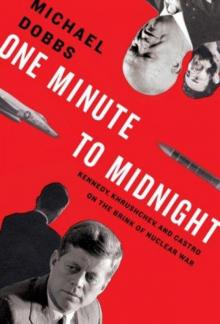 One minute to midnight
One minute to midnight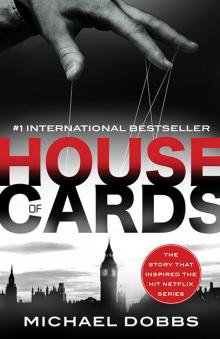 House of Cards
House of Cards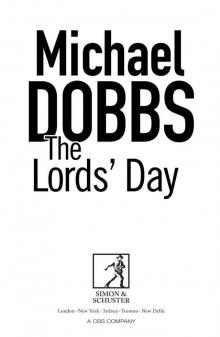 The Lords' Day (retail)
The Lords' Day (retail)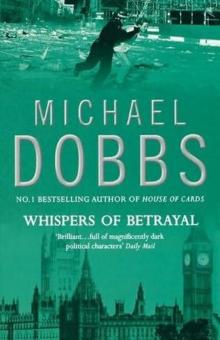 Whispers of betrayal tg-3
Whispers of betrayal tg-3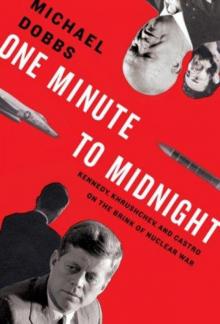 One minute to midnight: Kennedy, Khrushchev, and Castro on the brink of nuclear war
One minute to midnight: Kennedy, Khrushchev, and Castro on the brink of nuclear war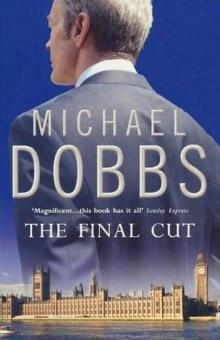 The Final Cut fu-3
The Final Cut fu-3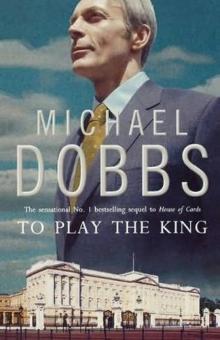 To play the king fu-2
To play the king fu-2 A Ghost at the Door
A Ghost at the Door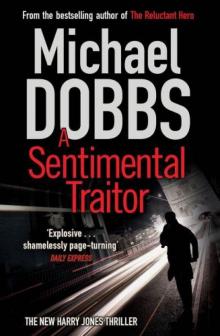 A Sentimental Traitor
A Sentimental Traitor